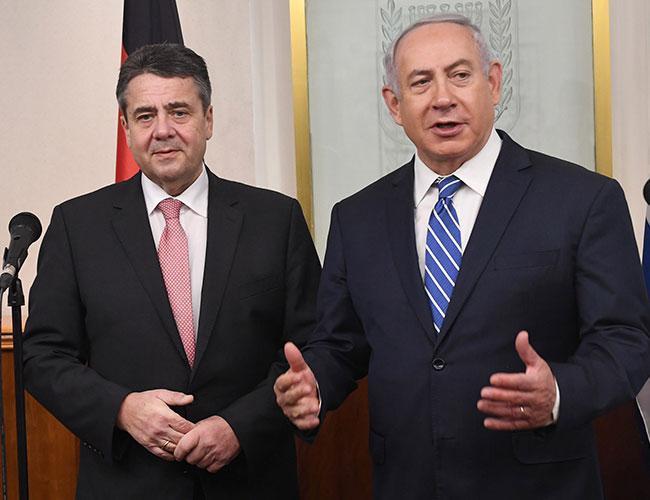Israeli PM, German minister engage in spat over ‘two-state solution’
JERUSALEM

Israeli Prime Minister Benjamin Netanyahu met German Foreign Minister Sigmar Gabriel on Jan. 31, with the two statesmen publicly engaging in a spat over Israel’s stance on a two-state solution to its conflict with the Palestinians.
Netanyahu had snubbed Gabriel in April when the visiting diplomat declined to call off meetings with rights groups critical of Israel’s government.
In statements after the Jan. 31 meeting, the two were cordial, but Netanyahu interrupted Gabriel when he talked about a two-state solution to the conflict.
Gabriel said he was “very thankful to hear that, of course, also the government of Israel wants to have two states” with secure Israeli borders.
Netanyahu, who heads what is seen as the most right-wing government in Israel’s history, interjected to reiterate his position that his country would have to maintain security control in the Palestinian territories under any peace arrangement.
“No, that we will control security west of the Jordan (river)... that is I think the first condition,” Netanyahu said.
“Whether or not it’s defined as a state when we have the military control is another matter, but I’d rather not discuss labels, but substance.”
A two-state solution has long been the ultimate goal of international efforts to mediate a peace deal between Israel and the Palestinians.
U.S. President Donald Trump has however declined to commit to a two-state solution, instead saying he can support it if both sides agree.
He has also recognized Jerusalem as Israel’s capital, breaking with decades of international consensus that the disputed city’s status must be negotiated.
Prominent members of Israel’s government openly oppose the creation of a Palestinian state, while some call for much of the West Bank, occupied by Israel in the 1967 Six-Day War, to be annexed.
Netanyahu says he wants the Palestinians to govern themselves, but in recent months has declined to specify whether that would mean an independent Palestinian state or some diluted form of autonomy.
Speaking later in Tel Aviv, Gabriel questioned Israel’s approach to the conflict.
“These, at best, mixed signals do not go unnoticed in Europe, where there is clearly growing frustration with Israel’s actions,” Gabriel said in a speech at a conference of the Institute for National Security Studies think-tank.
“Also in Germany, and frankly inside my own party, young people, the young generation, feel increasingly less inclined to accept what they deem unfair treatment of the Palestinians. And it’s increasingly difficult for people like me to explain to them the reasons why our support for Israel must persist. As a friend and close ally, we need to know if Israel is not supporting a negotiated solution to this conflict anymore.”
European nations have repeatedly warned that chances are diminishing for a two-state solution and called on Israel to halt settlement building in the West Bank.
Such criticism has led to tensions between some European officials and Netanyahu, who accuses them of overlooking Palestinian attacks and what he calls Palestinian incitement against Israel.
Gabriel also met Palestinian president Mahmud Abbas in Ramallah in the West Bank on Jan. 31.
He condemned Trump’s decision to withhold tens of millions of dollars in aid to the U.N. agency for Palestinian refugees.
Trump has also threatened to withhold hundreds of millions of dollars in aid to force the Palestinians to return the negotiating table to reach what he has called “the ultimate deal”.
Abbas has said the Jerusalem decision disqualifies the United States as mediator and has called Trump’s efforts the “slap of the century.
”Gabriel said when meeting Abbas that Jerusalem’s status must be negotiated and that “we are prepared with others in Europe and also in the region to make sure that the refugees’ situation does not worsen.”
He also warned that “we are moving further from Middle East peace every day.”
















